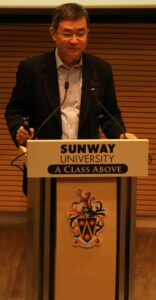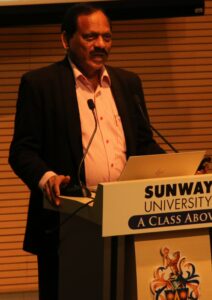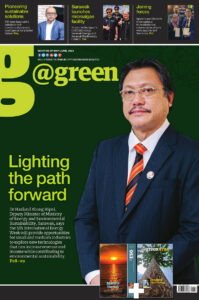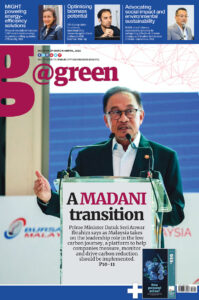ESG can be Considered an Investment rather than a cost with the Idea of Merging it with the Price Quality Method
BY DANIAL FAUZI
Although Environmental, Social and Governance (ESG) has sparked countless debates on its validity in tackling climate changes, societal issues and governing issues, there are few solutions to the problems.
Prof Lim Weng Marc, Dean of Sunway Business School, Sunway University Malaysia said that after the Covid-19 pandemic nearly crippled some countries, the state of the world worsened after borders were reopened. He remarked that the primary evidence of this issue stemmed from the global poverty rate that had increased for the first time in 20 years, with more than 700 million people in poverty when the pandemic struck.
The second piece of evidence is the health of the planet. The planet is unhealthy even though human activity was at a standstill in early 2020 when the pandemic hit.
Lim said Bursa Malaysia recently established new mechanism standards for companies to prepare ESG reports. The evidence is through a company’s Corporate Social Responsibility (CSR) report.
The gist is that when a company can utilise its profits for CSR, it can be considered a clear signal that it is profitable. Investors would then be more inclined to invest in that company. In a way, ESG is akin to CSR, except that ESG touches on environmental, social and governing compliances.
Lim was speaking at a recent forum titled “ESG Solutions: Collaborating for a Sustainable Future Sunway-MAPAN Sustainability Plenary” organised by Sunway University. The talk addressed the impacts of climate change on the economy, markets, people and society. It was aimed at finding solutions to the issues through concrete and collaborative actions by researchers, practitioners and the community.
The forum was the first in a series of lectures/ workshops/ seminars to engage the research community, industry, and regulators, including prospective postgraduates, to deliberate on solutions to address ESG concerns with a critical focus on Small and Medium-sized Enterprises (SMEs). SMEs play a crucial role in Malaysia’s economy and face unique challenges in addressing ESG concerns.
Lim said that ESG should transcend beyond just being compliant. “ESG could be considered an investment rather than a cost with the idea of merging ESG with PQM (Price Quality Method). Companies can report on their ESG activities, with ESG activities being an indicator of how well they are doing,” he said.

STRIKING AT THE ROOT CAUSE
Ong Pang Yen, Executive Director of the Chairman’s Office at Sunway Group Malaysia, attested to Lim’s sentiment. He said there were only two reasons ESG had recently gained traction despite being introduced in 2005.
The first was due to the Paris Climate Agreement in 2015, followed by the rollout of the United Nations SDGs (Sustainable Development Goals) to focus on social issues plaguing the world.
It is no myth that climate change is real and can severely impact the planet. Ong explained that Earth could naturally absorb 18 billion tonnes of CO2 (carbon dioxide) gasses through the oceans, lush jungles, forests, and soil.
However, with the start of the industrial revolution and the development of steam engines, the volume of CO2 gases steadily increased, explaining the rise in global temperatures and the volatility of weather patterns.
Additionally, in the modern era, the industrial sector emits about 40 billion tonnes of CO2 a year, resulting in 22 billion tonnes of CO2 gasses not being absorbed by the Earth, cultivating the greenhouse effect on the planet.
The Earth can only tolerate another 400 billion tonnes before the planet reaches the tipping point. Passing this point of no return will result in devastating effects, such as melting permafrost around the ice caps and rising sea levels.
“Organisations and companies needed to take the threats of climate change seriously as we are at a critical level of passing the no-return mark to ruin.”
Contributing to CO2 accumulation would be overpopulation. According to the United Nations, on Nov 15, 2022, the eight billionth person was born. Humanity could travel further and establish more settlements in a short timeframe. However, the economy needs to feed and sustain a burgeoning population.
Throughout the years, various countries’ economies have followed a linear path. This path utilises the planet’s natural resources, processing and manufacturing necessities and products for people to use, and finally discarding them, which leads to waste.
Unsurprisingly, this form of linear economy is not sustainable, not to mention the effects of social inequality and poverty that threatens the social stability of populations across the globe.

CRITICISM OF ESG AND POTENTIAL SOLUTIONS
“How prepared are we as individuals, businesses and SMEs when it comes to a great change in the world, the climate and society?” asked Ong.
“As ESG is a framework for organisations to consider the needs and methods to generate value for all organisational stakeholders, it is normal for parties to be cautious when investing in ESG strategies, such as how the Governor of Florida prohibits the integration of the ESG framework.
“It is because to get all stakeholders on board with the ESG concept, transparency and disclosure of an organisation’s goals and strategies are fundamental.”
There is also the moral and ethical dilemma of ESG as well. Ong brought up the Russian-Ukraine conflict as a prime example. The dispute highlights the dilemma of pulling out support for Russia as Russia’s fuel exports are more efficient to use when compared to other countries.
One could also look at the potential hypocrisy of governance within organisations where upper management would seek to use corporate loopholes and turn a blind eye to internal problems to save a few pennies for themselves or to hide their backdoor shenanigans, such as the Enron and recent FTX scandals.
However, despite these criticisms, there are potential solutions for the ESG framework for organisations.
GENERATING PROFITS WITHOUT HARMING THE PLANET
Ong suggested that countries focus on a circular or doughnut economy instead of a linear one. The framework for this economy focuses on reuse, reduce and recycle philosophies.
This framework may stand a chance in healing the planet while also fulfilling the needs of the growing population. This economy would also usher in the mentality whereby ESG does not lose profit but instead generates profit without harming the planet.
Ong also noted a suggestion from the Steward Leadership in Singapore. The organisation suggested that ESG be renamed ESL (Environment, Society, Leadership). The justification is that the strategies for sustainability should be anchored in values and ethics.
“Although ESG mechanisms may be flawed and the issues are real, organisations must be purpose-driven to ensure that the future of sustainability is guaranteed,” he added.
Other speakers also made presentations during the forum on the journey towards sustainability, such as Prof Saidur Rahman, Head, Centre for Nano-Materials and Energy Technology, Sunway University. This department focuses on the application of nanotechnology. Prof Agamuthu Pariatamby from the Jeffery Sachs Centre on Sustainable Development, Sunway University, presented on microplastic waste treatment for SMEs. – @ESG










